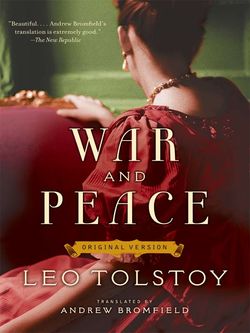Читать книгу War and Peace: Original Version - Лев Толстой, Leo Tolstoy, Liev N. Tolstói - Страница 27
XVII
ОглавлениеThe countess felt so tired after the visits that she gave orders not to receive anyone else, and the doorman was given strict instructions to invite everyone who might still arrive with congratulations to dine. Besides that, she wanted to have a confidential talk with her childhood friend Anna Mikhailovna, whom she had not seen properly since her arrival from St. Petersburg. Anna Mikhailovna, with her careworn and agreeable face, moved closer to the countess’s armchair.
“I shall be entirely candid with you,” said Anna Mikhailovna. “There are so few of us old friends left. That is why I value your friendship so.”
The princess looked at Vera and stopped. The countess squeezed her friend’s hand.
“Vera,” said the countess, addressing her elder, and obviously less loved daughter. “How can you be so completely tactless? Surely you can tell you are not needed here? Go to your sisters or …”
The beautiful Vera smiled, apparently not feeling in the least insulted, and went to her room. But as she passed by the nursery she noticed two couples in there, seated symmetrically at the two windows. Sonya was sitting close beside Nikolai, who, with his face flushed, was reading her the first poem that he had ever composed. Boris and Natasha were sitting by the other window without speaking. Boris was holding her hand and he let go of it when Vera appeared. Natasha picked up the little box of gloves standing beside her and began sorting through them. Vera smiled. Nikolai and Sonya looked at her, got up and left the room.
“Natasha,” said Vera to her younger sister, who was intently sorting through the scented gloves. “Why do Nikolai and Sonya run away from me? What secrets do they have?”
“Why, what business is it of yours, Vera?” Natasha asked protectively in her squeaky voice, continuing with her work. She was evidently feeling even more kind and affectionate towards everyone because of her own happiness.
“It’s very stupid of them,” said Vera in a tone that Natasha thought sounded offensive.
“Everyone has their own secrets. We don’t bother you and Berg,” she said, growing heated.
“How stupid! You’ll see, I’m going to tell mama how you carry on with Boris. It’s not right.”
“Natalya Ilinishna treats me perfectly well. I can’t complain,” he said sarcastically.
Natasha did not laugh and looked up at him.
“Don’t, Boris, you’re such a diplomat” (the word diplomat was very popular with the children, in the special meaning which they gave to this word), “it’s really boring,” she said. “Why is she pestering me?”
She turned to Vera.
“You’ll never understand,” she said, “because you’ve never loved anyone, you have no heart, you’re nothing but Madame de Genlis” (this nickname, which was regarded as very insulting, had been given to Vera by Nikolai) “and your greatest pleasure is to cause trouble for others. You can flirt with Berg as much as you like.”
She blurted this out hurriedly and flounced out of the nursery.
The beautiful Vera, who had such an irritating, disagreeable effect on everyone, smiled again with the same smile that meant nothing and, apparently unaffected by what had been said to her, went up to the mirror and adjusted her scarf and hair. As she gazed at her own beautiful face, she visibly turned colder and calmer than ever.
